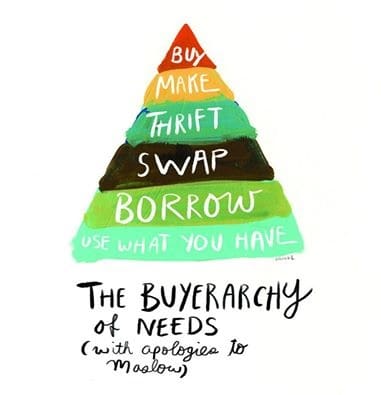
It is so easy to develop the habit of needing something and running to the store immediately to buy it. It's what we do. We are consumers. Everything is at our fingertips and if we don't have the money, we have plastic. Why wait? Get it now!
Sarah Lazarovic, a graphic artist who writes and cartoons a lot about consumerism, has wise words for us.
"Eat food. Not too much. Mostly plant."
"Buy clothes. Not too many. Mostly quality."
These are short and sweet and sum up the way we should consume things.
My favorite graphic of hers is the Buyerarchy of Needs, based on Maslow's hierarchy of needs. It shows us, in a sweet little illustration what I wish we could all modestly display in our homes, the simple alternatives to rushing out and purchasing what we need. Here is her buying pyramid.
Use what you have
This is the base of the pyramid and is our biggest consideration. Often, we can make do with what we have on hand. Is there something here in my home that will do? I am sometimes guilty of that. Oops! I'm out of baking powder, so I'm going to take 40 minutes of my precious time and about $2 worth of gas to run and buy baking powder even though tomorrow is my shopping day. The better option - 1 teaspoon baking powder = 1/3 teaspoon baking soda plus 1/2 teaspoon cream of tartar. This is a great site for kitchen substitutions, but that is just the beginning. There are lots of things we can make do with if we give it a few moment's thought.
Borrow
I have a great example of this concept. My parents served a mission in Armenia for our church. It was humanitarian in nature, caring for those devastated by an earthquake. A couple that they served with were people beyond any wealth I've ever known. The wife came to my mother to ask if she had a sweater she could borrow. Please, understand when I tell you, these people could have bought a mall to get her a sweater. Instead, realizing they had better things to do with their money, she sweetly asked to borrow this little thing. So here is the crux of the matter. Is there someone you know from whom you can borrow that thing you need? Particularly if it is something you'll need once or twice and not regularly?
Swap
I love the idea of swapping or bartering. Often we have things lying around that we don't need and there is very likely something we do need that is just lying around someone else's place. Why not barter for goods or services? This is an article that addresses this practice a little more in-depth. Check it out. The shame is not in suggesting a swap. It is in having things we don't need when others might and buying things when we can get them for a barter.
Thrift
Browsing thrift shops is one of life's simple pleasures and finding something you need for pennies on the dollar - well, that induces in me something akin to a runner's high in the more athletic. I love going into a secondhand shop with a list in my hand and walking out with the entire list for less than I would have paid for one item retail. This is something I cannot adequately explain. It is something you have to try for yourself. Also, it is yard sale time! Get out and meet new friends by buying their discards.
Make
Making from scratch is more often than not a less expensive alternative to buying. It is more expensive than the alternatives below it on the pyramid, but still something worthy of consideration. Can I make a costume for my kids for Halloween? Can I paint my own walls, and not hire a painter? Can I grow my own herbs and save a bundle on buying fresh? There are lots of ways to save money by doing it yourself.
Buy
This is the smallest portion of the pyramid and should be considered as a last resort. If you have exhausted all other options, then there is no problem buying. That is, once you have asked yourself that all important question - is this something we need or something we want? Is it something we should put on credit, knowing that we will likely pay for it a few times over before we pay it off? Is it something for which we can save? Once you have scrutinized and reached an intelligent, well-thought-out answer, go for it.
It is difficult being a savvy consumer in this day and age when things are upgrading and improving at the speed of light. But, it is within our power to slow down and be thoughtful about our needs and purchases.
This is also a vital lesson to teach our children. The last thing any parent wants is grown children and their families moving back home because they are in debt over their heads because they had to have it all at once.
Teach your children about thoughtful consumerism, both by example and by lesson. Let them learn the joy of saving for something or making do. Introduce them to bartering and thrift shopping.
You have it within your power and responsibility to raise well-informed, patient and savvy consumers.

